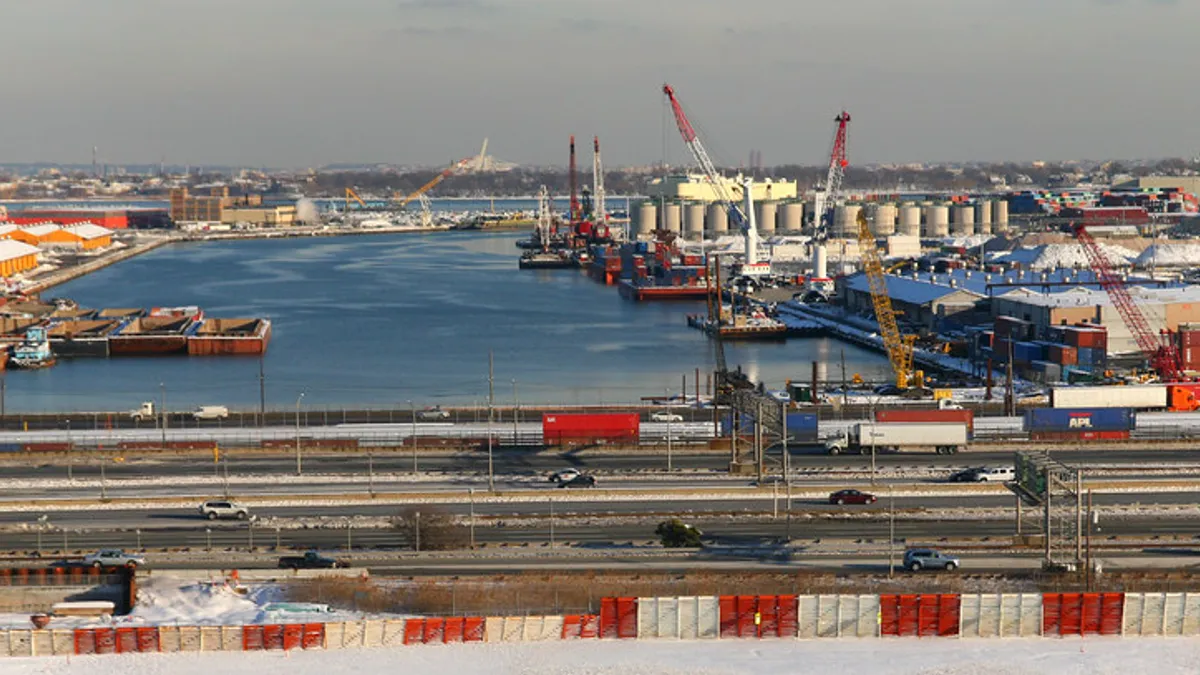Dive Brief:
- Container shipping and logistics startup Loadsmart received $19 million in funding from Maersk Growth and Ports America, the country's largest port operator to support its Smart Drayage initiative, the company announced in a press release this week. The program uses an API that syncs with a port terminal's operating system, matching containers with trucks based on ease of access, load times, haul distances and other factors. This data is then made available to truckers via a mobile app that enables them to book loads in real time.
- On the back end, Smart Drayage gives ports a view of where containers are not only geographically in the terminal, but vertically in the stacks, Ricardo Salgado, CEO and co-founder of Loadsmart, told Supply Chain Dive in an interview. This way, the API can automatically connect truckers with the more easily accessible containers at the top of a stack, for example, removing the need for port operators to unstack and restack them to find a specific container.
- The initiative launched at the Port Newark container terminal in New Jersey in April 2019 where Loadsmart is working with a pilot batch of Maersk containers (among other carriers). Salgado hopes Smart Drayage can reduce time for trucks to enter and exit the port by 25% and reduce container shuffles by up to 50%. The company has plans to expand to one other port in Q4 and to at least two in Q1 2020, though Salgado declined to name specific locations.
Dive Insight:
The digital freight brokerage and logistics market has gotten increasingly crowded over the years, now including services offered by Amazon, Convoy, NEXT Trucking, Uber and others. Loadsmart sees its focus on drayage as a particular value-add as the industry has begun to warm up to digitalization.
Currently, wait times and traffic at ports are major problems for ports and truckers, who may eat up valuable hours-of-service time waiting in line for a container. According to research by NEXT Trucking, which uses a relay-based approach where trucks coordinate picking up and dropping off containers in a single trip, drayage delays can cost the industry up to $350 million annually.
"Customers want delivery instantly, for free, seamlessly, and with visibility," Salgado told Supply Chain Dive. "Without having data visibility it is difficult to go out there and do that." As a result, he said more ports are investing in the transition from "focusing on the desktop" to thinking about how to better leverage cloud and automation technologies to stay competitive.
Because Smart Drayage is an API tool, it requires a port to have an existing ERP or digital system with which it can integrate to pull data. So for ports looking to make the jump to smart technologies, Salgado said, transitioning from static databases or Excel sheets to an SAP or Oracle system can be the first step in bridging that gap. "Mobility is table stakes nowadays," Salgado said, "so this is part of that journey to optimize the flow of drayage."
Loadsmart has raised $53.4 million in capital to date, according to the release. Salgado noted that Maersk also led the company's earlier funding round, raising $21.6 million in October 2018. The move is in line with the carrier's increased interest in freight logistics startups in recent years, funded through its Growth Ventures arm.
"We really like their thinking and ambition to re-engineer the long-standing inefficient industry practices," Betty Liu operating partner at Maersk Growth told Supply Chain Dive via email. "The smart drayage product will fix today’s siloed processes as they exist today and be capable of integrating with future autonomous truck or automated terminal operations."
Maersk Growth recently announced it is establishing a new digital freight booking platform with one of India's largest online freight marketplaces, Blackbuck. The goal of the partnership is to reduce costs, open up visibility and reduce transit times for ocean and trucking freight connections in the country.













